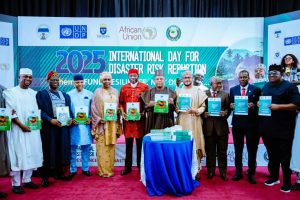The Federal Government has announced plans to empower communities across Nigeria to manage their own safety against floods and other disasters, as part of a broader effort to strengthen national resilience and reduce dependence on post-disaster relief interventions.
Vice President Kashim Shettima disclosed this on Monday in Abuja during the commemoration of the 2025 International Day for Disaster Risk Reduction (IDDRR), themed “Fund Resilience, Not Disasters.”
Read Also: Nigeria to save N3trn annually from cassava bioethanol – Shettima
Read Also: NEMA calls for comprehensive action plan on disaster risks
Shettima emphasized that disaster preparedness can only be effective when communities are equipped and empowered to take charge of their safety, noting that “no amount of preparedness will produce tangible results if local communities are not part of the process.”
“Resilience cannot be guaranteed by government alone,” the Vice President said. “It is reflected in how cities are planned, how businesses protect their workers, and how communities share information and look out for each other.”
He called for stronger collaboration with the private sector, urging companies to embed risk reduction into their operations and investment decisions.

Shettima also highlighted the role of academia, civil society, and research institutions in generating data, innovation, and practical solutions for disaster prevention.
“None of these efforts will yield results unless we empower and support our communities to take ownership of their safety. They are the foundation of whatever strategy we adopt and the heartbeat of our national resilience,” he added.
The Vice President described the IDDRR theme as a reminder that “it is far wiser, far cheaper, and far more humane to prepare for disasters before they strike than to rebuild after they destroy,” stressing that every naira spent on preparedness saves much more in future recovery costs.
According to him, the Tinubu administration is integrating disaster risk reduction into key sectors such as agriculture, infrastructure, education, and health, while expanding early warning systems to ensure timely alerts against floods, droughts, and disease outbreaks.
“We are strengthening state and local emergency management agencies through training, technology, and coordination support,” he stated. “We are also developing a National Disaster Risk Financing Framework to guarantee that funding for prevention and preparedness is available when and where it is needed.”
Shettima identified priority investments to include drainage systems instead of relief camps, stronger schools and hospitals rather than temporary shelters, and climate-smart tools for farmers in place of post-flood food aid.
Earlier in his remarks, Governor Dauda Lawal of Zamfara State commended the National Emergency Management Agency (NEMA) for launching a five-year strategic plan to enhance Nigeria’s disaster management framework. He proposed a Public-Private Partnership (PPP) model for sustainable funding of disaster management in the country.
The Minister of State for Humanitarian Affairs and Poverty Reduction, Dr. Yusuf Tanko Sununu, said the forum was convened to develop a comprehensive approach to tackle both natural and human-induced disasters. He emphasized the need to diversify funding sources and ensure better reach to underserved communities.
In her address, NEMA’s Director-General, Hajiya Zubaida Umar, described the IDDRR commemoration as a defining moment in Nigeria’s commitment to proactive disaster management. She said discussions from the event would help galvanize innovative financing to sustain large-scale risk reduction efforts nationwide.
The Chairman of the Senate Committee on Special Duties, Sen. Kaka Shehu Lawan, and his counterpart in the House of Representatives, Hon. Joseph Bassey, both pledged continued legislative support for NEMA’s operations, including amendments to its enabling Act for improved effectiveness.
Also speaking, Dr. Charles Usie, Country Director of Plan International Nigeria, called for improved transparency, better data management, and stronger coordination across agencies to transform NEMA into a modern disaster management institution.
The event, attended by government officials, development partners, and civil society organizations, underscored the call for a shift from reactive disaster response to proactive resilience funding and community empowerment.



